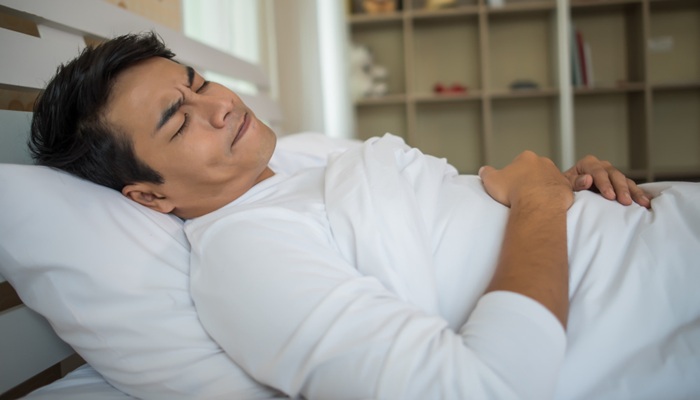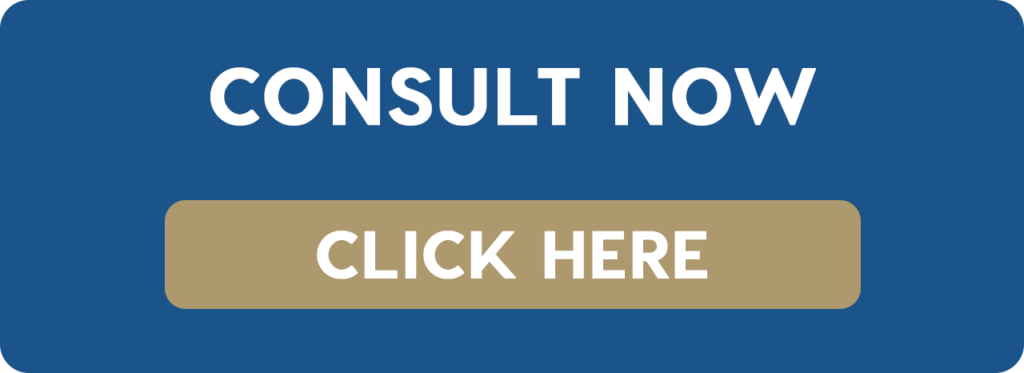Sleep apnea is a disorder in which breathing repeatedly stops during sleep. This can occur due to a blocked airway (obstructive sleep apnea) or because the brain fails to properly control breathing (central sleep apnea).
When oxygen levels drop, the body’s survival reflex kicks in and briefly wakes you up to resume breathing. Although this reflex is life-saving, it disrupts your sleep cycle and prevents deep, restful sleep. Over time, sleep apnea can place strain on the heart and become life-threatening if left untreated.
Contents
Types of Sleep Apnea
There are three main types of sleep apnea:
- Obstructive Sleep Apnea (OSA): This occurs when the muscles in the throat relax during sleep, causing nearby tissues to block the airway (trachea) and restrict airflow.
- Central Sleep Apnea (CSA): This type happens when the brain fails to send proper signals to the muscles that control breathing during sleep.
- Mixed or Complex Sleep Apnea: This is a combination of obstructive and central sleep apnea.
Studies estimate that around 1 billion people aged 30–69 globally suffer from obstructive sleep apnea. Although central sleep apnea is less common than OSA, it is not considered a rare condition.
Common Symptoms of Sleep Apnea
General symptoms of sleep apnea include:
- Frequent nighttime awakenings
- Breathing stops during sleep (often noticed by a bed partner)
- Irregular breathing patterns (e.g., fast, deep, then shallow breathing that pauses before normalizing)
- Loud snoring
- Waking up gasping or choking
- Feeling tired, drowsy, or fatigued upon waking
Other possible symptoms include:
- Morning headaches
- Night sweats
- Mood changes such as depression or anxiety
- Restless sleep
- Sexual dysfunction
It’s important to note that children may show different signs of sleep apnea compared to adults.
Causes of Sleep Apnea
Sleep apnea can result from:
- Airflow obstruction in the upper airway during sleep
- Problems with how the brain controls breathing while asleep
Risk Factors for Sleep Apnea
Sleep apnea can affect both children and adults. Common risk factors include:
- Family history of sleep apnea (genetic predisposition)
- Heart disease, history of stroke, or high blood pressure
- Enlarged tonsils
- Obesity or being overweight
The risk of sleep apnea increases with age. Men are more likely to be diagnosed before the age of 50.
Although obesity is a major risk factor, sleep apnea can occur in individuals of any size or weight.
Complications of Sleep Apnea
Sleep apnea can lead to serious, potentially life-threatening complications, such as:
- Excessive daytime sleepiness or microsleep (brief, unintended sleep episodes that are dangerous, especially while driving or operating machinery)
- Heart rhythm disorders (arrhythmias), such as atrial fibrillation
- High blood pressure (hypertension)
- Heart damage and heart failure
- Sudden cardiac death
Treatment Options for Sleep Apnea
Doctors will recommend different treatment options based on the type and severity of sleep apnea. Common approaches include:
- CPAP machines (Continuous Positive Airway Pressure) to keep the airway open during sleep
- Managing underlying medical conditions that increase the risk of sleep apnea
- Adjusting sleeping positions, such as avoiding back sleeping
- Oral appliances (mouthpieces) to help keep the airway open
- Neuromuscular Electrical Stimulation (NMES) devices to prevent the tongue and upper airway muscles from collapsing during sleep
- Medications prescribed by a physician
- Surgical procedures when necessary
Surgery for Sleep Apnea
Surgical procedures on the nose, mouth, or throat can help remove obstructions in the airway. These may include:
- Jaw surgery: Adjusting jaw position to prevent soft tissues from collapsing into the airway.
- Nasal surgery: Procedures like septoplasty, which straightens the nasal septum to improve airflow through the nasal passages and respiratory tract.
Sleep Apnea Expert at Mandaya Royal Puri Hospital
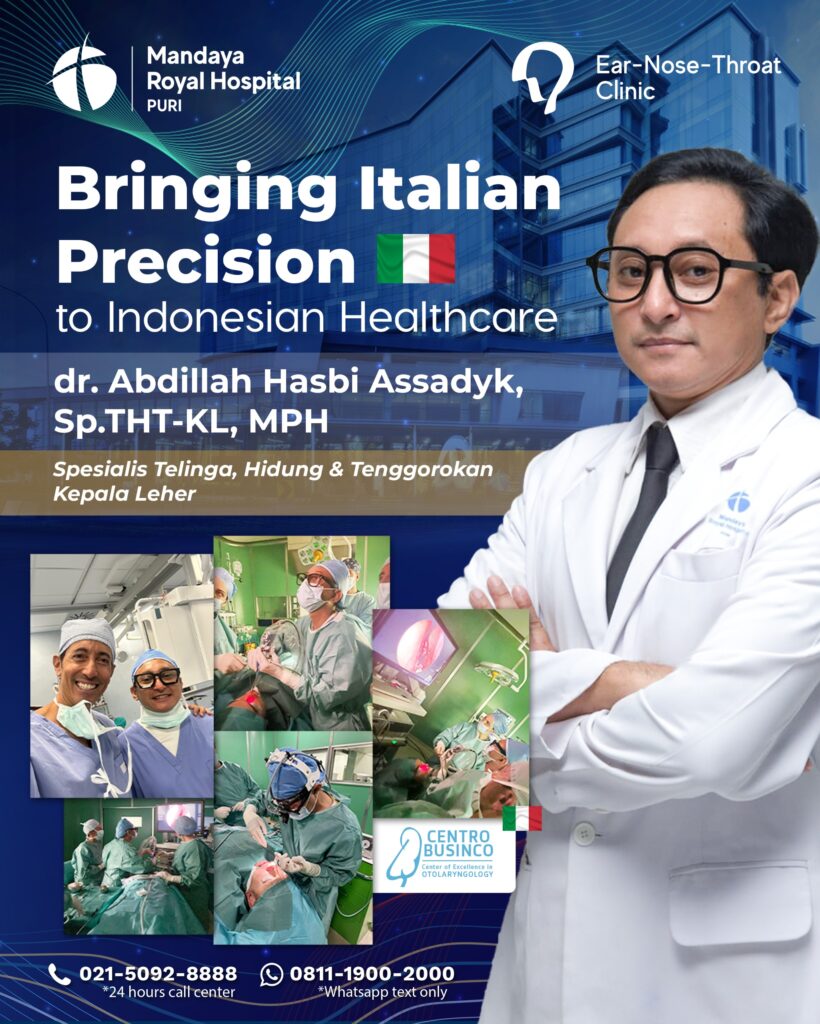
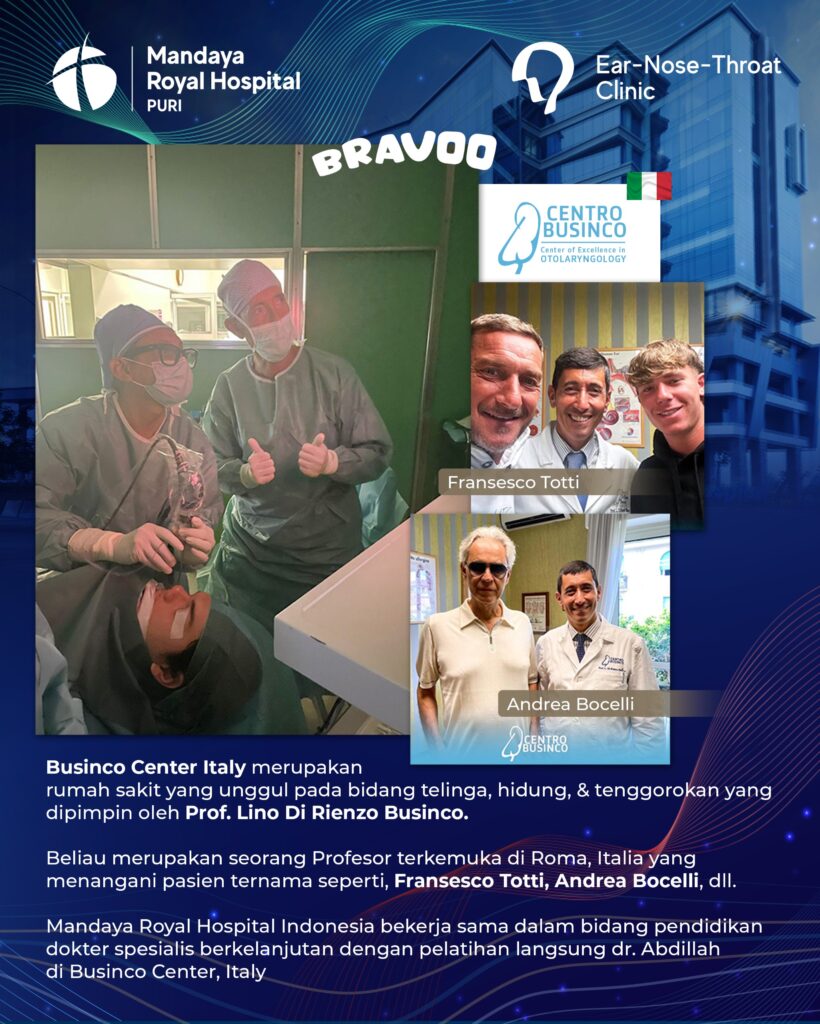
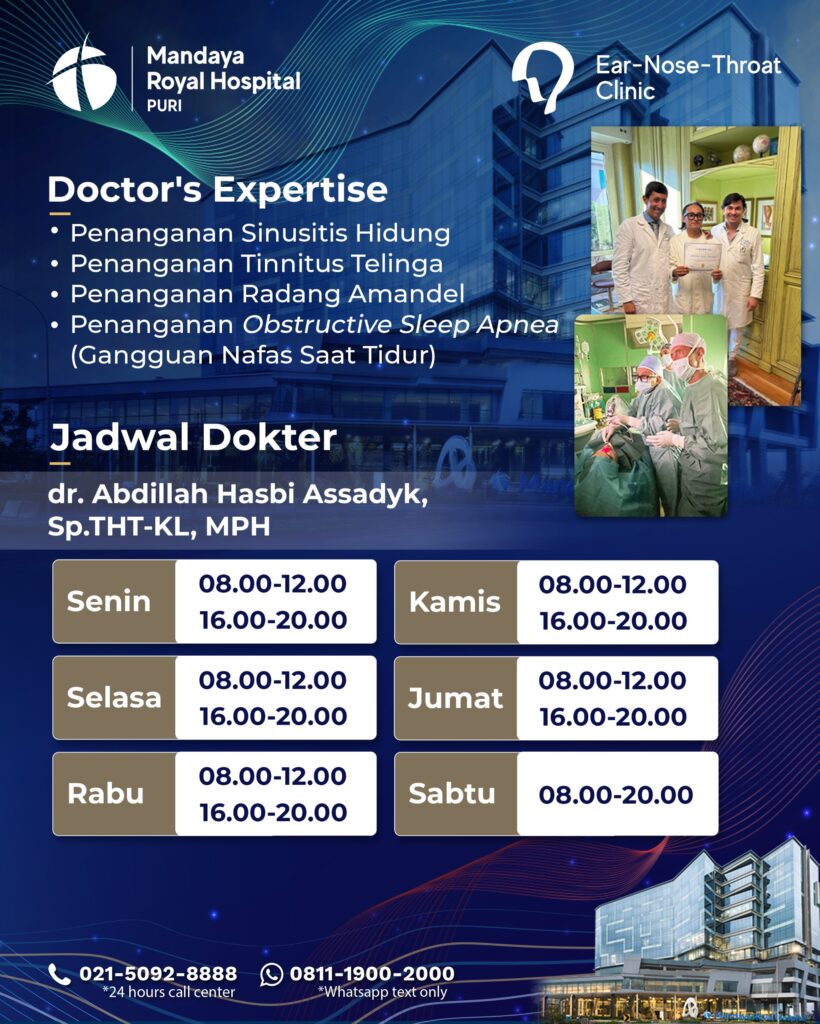
The Sleep Apnea Center at Mandaya Royal Puri Hospital is staffed by experienced specialists, including dr. Abdillah Hasbi Assadyk, Sp.THT-KL, an ENT doctor with special expertise in treating sleep apnea.
To strengthen his skills, dr. Abdillah recently completed intensive training in Italy, focusing on sinusitis and sleep disorder management, particularly sleep apnea—a condition often marked by snoring and breathing interruptions during sleep.
This specialized program aimed to enhance diagnostic and treatment capabilities for complex cases involving sleep apnea and chronic sinus infections.
During his training, dr. Abdillah had the rare opportunity to learn directly from Prof. Lino Businco, a globally respected ENT expert who has treated international figures such as opera singer Andrea Bocelli and Italian football legend Francesco Totti.
With this international knowledge and experience, dr. Abdillah is well-prepared to deliver comprehensive, modern, and globally standardized ENT care to patients in Indonesia.
dr. Abdillah Hasbi Assadyk, Sp.THT-KL – Clinic Hours at Mandaya Royal Puri Hospital
- Monday: 08:00 – 12:00 WIB & 16:00 – 20:00 WIB
- Tuesday: 08:00 – 12:00 WIB & 16:00 – 20:00 WIB
- Wednesday: 08:00 – 12:00 WIB & 16:00 – 20:00 WIB
- Thursday: 08:00 – 12:00 WIB & 16:00 – 20:00 WIB
- Friday: 08:00 – 12:00 WIB & 16:00 – 20:00 WIB
- Saturday: 08:00 – 20:00 WIB
To make your visit to Mandaya Royal Puri Hospital more convenient, use the Chat via WhatsApp, Book Appointment feature, or the Care Dokter app—available on Google Play and the App Store. These tools help you schedule visits, check queue numbers, and access complete hospital information.

